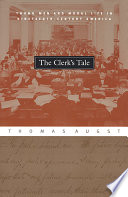 | Natalie Depraz, Francisco J. Varela, Pierre Vermersch - 2003 - 296 páginas
...meaning conferred upon experience by the English philosophers of the 18th and 19th centuries. Let us suppose the mind to be, as we say, white paper, void of all characters, without any ideas: - How comes it to be furnished? (...) Whence has it all the materials of reason and knowledge? To this... | |
 | Thomas Augst - 2003 - 334 páginas
...(1690), it still retained its association with the process of imprinting, writing, and engraving: "Let us suppose the mind to be, as we say, white paper void of characters." 12 Locke's theories of education and psychological development would develop the figurative... | |
 | Carl Zimmer - 2004 - 382 páginas
...method that his friend Sydenham used with diseases. Locke argued that the mind was empty at birth. "Let us then suppose the mind to be, as we say, white...paper, void of all characters, without any ideas," he proposed. "How comes it to be furnished?" He argued that through the senses, ideas entered the mind... | |
 | Athanassios Raftopoulos - 2005 - 258 páginas
...Senses at first let in particular Ideas, and furnish the yet empty Cabinet" (Locke 1689, I, 1, §15) or "Let us then suppose the Mind to be, as we say, white...Paper, void of all Characters, without any Ideas;" (II, 1, §2) On the other hand, the rationalists asked whether it is possible that the mind presents... | |
 | Oliver J. Thatcher - 2004 - 466 páginas
...to every one's own observation and experience. 2. All Ideas Come from Sensation or Reflection. — Let us then suppose the mind to be, as we say, white paper, void of all characters, without any ideas ; how comes it to be furnished ? Whence comes it by that vast store which the busy and boundless fancy... | |
 | Paul Lodge - 2004 - 328 páginas
...is that all our ideas come from "experience," of which he finds two kinds, sensation and reflection: Let us then suppose the Mind to be, as we say, white...Paper, void of all Characters, without any Ideas; How comes it to be furnished? Whence comes it by that vast store, which the busy and boundless Fancy... | |
 | Jörg Dünne, Hermann Doetsch, Roger Lüdeke - 2004 - 364 páginas
...Wirklichkeit der vergleichenden Analyse einer vernunftbegabten Urteilskraft zur Verfügung stehen: „Let us then suppose the Mind to be, as we say, white Paper, void of all Character without any Ideas".24 Tatsächlich greift auch Locke zur 18 Giesecke (1998a/1991), 33. "... | |
 | Jonathan Dollimore - 2004 - 420 páginas
...assumptions, his empiricist epistemology nevertheless leads him to the radical supposition that the mind is 'as we say, white Paper, void of all Characters, without any ideas'. He then asks 'how comes it to be furnished? . . . Whence has it all the materials of Reason and Knowledge?... | |
 | Mary Midgley - 2005 - 430 páginas
...version of that doctrine. Locke himself had meant by it merely that we are born without knowledge: 'Let us then suppose the mind to be, as we say, white...paper, void of all characters, without any ideas; how comes it to be furnished? ... To this I answer in one word, from EXPERIENCE; in that all our knowledge... | |
 | Catherine E. Ingrassia, Jeffrey S. Ravel - 2005 - 364 páginas
...Locke's famous metaphor of the mind as a tabula rasa offers a view of the human subject as narrative: "Let us then suppose the mind to be, as we say, white...paper, void of all characters, without any ideas; how comes it to be furnished? Whence comes it by that vast store which the busy and boundless fancy... | |
| |